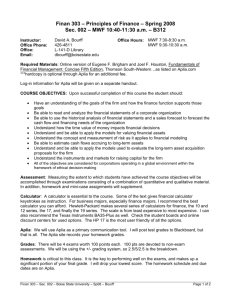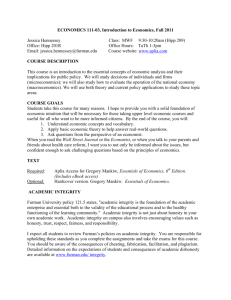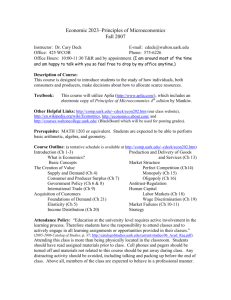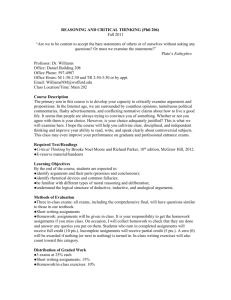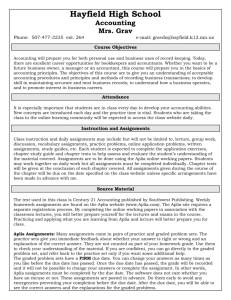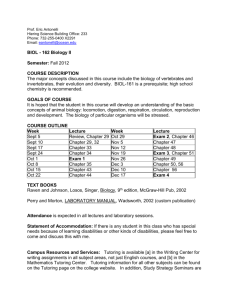Finance 221
advertisement
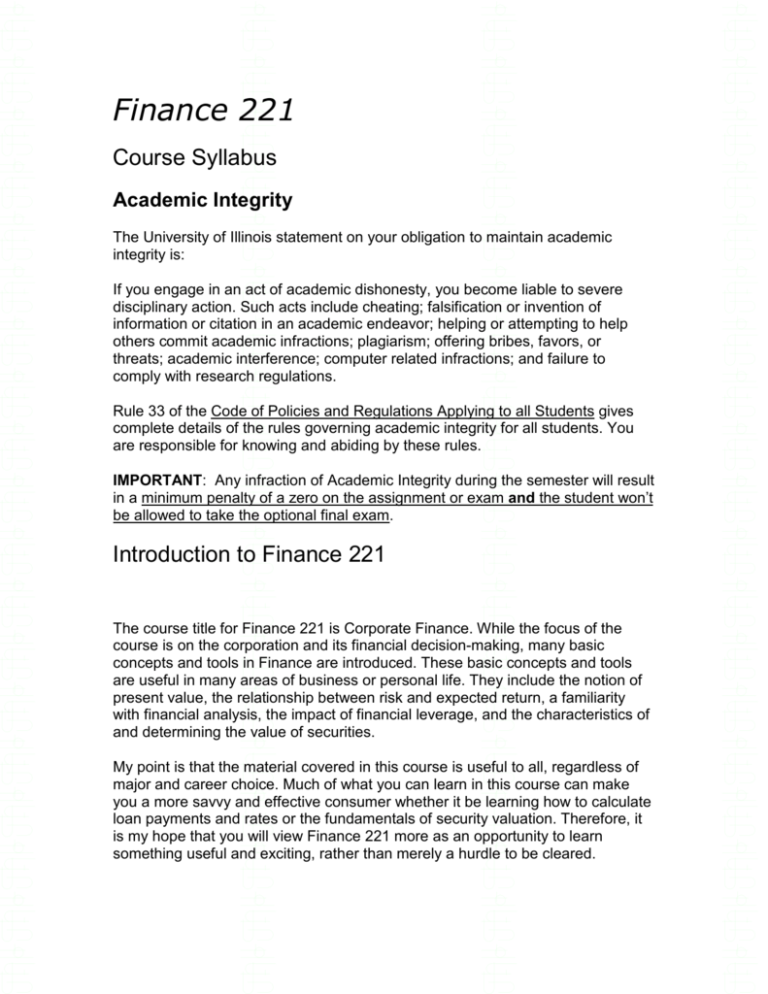
Finance 221 Course Syllabus Academic Integrity The University of Illinois statement on your obligation to maintain academic integrity is: If you engage in an act of academic dishonesty, you become liable to severe disciplinary action. Such acts include cheating; falsification or invention of information or citation in an academic endeavor; helping or attempting to help others commit academic infractions; plagiarism; offering bribes, favors, or threats; academic interference; computer related infractions; and failure to comply with research regulations. Rule 33 of the Code of Policies and Regulations Applying to all Students gives complete details of the rules governing academic integrity for all students. You are responsible for knowing and abiding by these rules. IMPORTANT: Any infraction of Academic Integrity during the semester will result in a minimum penalty of a zero on the assignment or exam and the student won’t be allowed to take the optional final exam. Introduction to Finance 221 The course title for Finance 221 is Corporate Finance. While the focus of the course is on the corporation and its financial decision-making, many basic concepts and tools in Finance are introduced. These basic concepts and tools are useful in many areas of business or personal life. They include the notion of present value, the relationship between risk and expected return, a familiarity with financial analysis, the impact of financial leverage, and the characteristics of and determining the value of securities. My point is that the material covered in this course is useful to all, regardless of major and career choice. Much of what you can learn in this course can make you a more savvy and effective consumer whether it be learning how to calculate loan payments and rates or the fundamentals of security valuation. Therefore, it is my hope that you will view Finance 221 more as an opportunity to learn something useful and exciting, rather than merely a hurdle to be cleared. The textbook and supporting materials are excellent. I have reviewed about all of the major textbooks on the market, and I feel that the text material selected from the Brigham & Houston Fundamentals of Financial Management textbook is outstanding. Also, I strongly recommend that you sign up for the Wall Street Journal. Discounted subscriptions to the paper and internet versions of the Wall Street Journal are available as low as $15 for 15 weeks. I encourage you to keep up with financial and business news and try to find stories that relate to the course, and I will point out and integrate relevant Wall Street Journal articles in class as we go through the semester. This semester continues with a blended learning approach to Finance 221. The two traditional lectures each week have been replaced with videos recorded during a summer seminar version of Fin 221. We will now meet as a large group once each week on Tuesday in addition with your smaller (35-40 students) discussion section on Thursday or Friday. In the Tuesday large meetings (that we will call Town Meetings or TM in the course schedule), I will address some of the most common questions on the current and previous week’s material and common problem areas or topics that are apparent from that week’s conceptual based (Monday) graded pre-flight assignment. The discussion section will consist of a beginning of the class group exercise followed by additional review and help. Our goal is to make these two meetings centered on aiding your learning of the class material. This approach will work best if you make the effort to read the textbook material, review the video material, and make a good effort on the pre-flight assignment BEFORE attending the class meetings. To help you in your preparation, we include featured video clips along with the pre-flight assignment and denote other recommended video clips for the week. At the end of each chapter we will test your understanding with an online assignment (Aplia). More detail of required activities and your regular preparation for the course will be discussed throughout this syllabus. The elements of this Syllabus are designed to aid you as you undertake the study of Finance in this course. Use the contents of this syllabus (1) to know precisely what will be asked of you as a student in Finance 221, (2) to know the exact schedule of classes, assignments, and exams, and (3) to supplement and expand on the material presented in the textbook. I encourage your active participation in both the town meeting and discussion section. An active approach to learning with your mind engaged will enhance the payoff for you from this course. Be sure to relate the material of this course to the financial activity you see and read about in the world around you. When you raise issues and ask questions, you aid the learning process for all and emphasize the relevance of the material to everyday life. I wish you both success and fun in learning! Prof. Michael A. Dyer Lecture and Discussion Times Finance 221 Corporate Finance Fall 2013 Town Meetings: 9, & 10 TUES in Deloitte Auditorium in BIF Discussion Section: TH/FRI Course Website: Fin 221 Illinois Compass 2G BIF Emergency Procedures Because BIF is not a designated tornado shelter, in the event of a tornado warning please seek shelter in the Wohlers Hall basement or the Armory (the nearest designated University tornado shelters). If a tornado is imminent, the BIF basement stairwells can be used on an emergency basis. In the event of a fire in BIF, exit BIF and proceed to 141 Wohlers Hall. In the event of threat from a shooter on campus, lock down the classroom and move to a place of safety within the classroom. If you encounter a suspicious package, do not touch the package, alert campus security, and refrain from cell phone usage until the situation is resolved. More detailed information and action instructions are available in the BIF Building Emergency Action Plan. Office Hours and Teaching Assistants Professor Mike Dyer Office: 343J Wohlers Hall Office Hours: 2-3:30 PM Tuesday and 10:30-noon Thursday. Office Phone: 244-7807 E-mail: dyer1@illinois.edu Teaching Assistants’ Office Hours Office Location 104 Survey Mail Box: 339 Wohlers Hall, Department of Finance Course Overview and Objectives Finance 221 provides an introduction to corporate financial management. Finance is centered on the idea of valuing things. What is the value of a bond, a stock, a firm, or even a college education? This course is meant to teach you how to compute value. Since this is an introductory course, we will focus on the basics of computing value without focusing too much on the enormous number of complicating factors that exist in the real world when we actually try to calculate value. Course Objectives: To make the study of corporate financial management an exciting and stimulating learning experience. To understand the goal of the corporation. To understand and apply the time value of money in order to value financial and real asset investments. To involve you in measuring and analyzing the financial performance of a firm's management. To show you how measure cash flow for an individual asset and firm. To illustrate the scientific framework underlying financial decision making and how it is coupled with sound judgment by management. Course Prerequisites This course presumes some background on your part in the areas of accounting, statistics, and knowledge of computer electronic spreadsheet software. The material in this section describes the knowledge and skill background you should have at the beginning of the course and the requirements that will need to be completed during the semester. It is assumed that all students taking this course will already have completed at least the following courses or their equivalents: 1. Accy 200 or concurrent enrollment in Accy 202 2. Economics 202 or equivalent basic stats course like STAT 100 3. Excel or other spreadsheet familiarity or competency. From your Accountancy class(es) you should be familiar with the structure of basic financial statements and the meaning of the items listed in these statements. From Statistics (Economics 202) you should be familiar with various measurements of distributions, such as the mean, variance, and standard deviation. In the Computer Science area you should be comfortable working on microcomputers and spreadsheet software like Excel or Lotus 1-2-3. Course Textbook Custom version of Brigham & Houston, Fundamentals of Financial Management, 13th ed. Cengage/Southwest with Mindtap. This is a shrinkwrapped, 3-hole punched, loose-leaf hard copy of the needed textbook materials that contains only the chapters that we will cover this semester and an online version of the entire book that also includes Aplia access (estimated cost: $85). As an option, students can purchase Mindtap (with Aplia) access alone for the above title (Fundamentals of Financial Management, 13th ed. By Brigham & Houston). The Aplia access gives you an online electronic version of the entire textbook (estimated cost: $90). See Aplia Homework & Access section of this syllabus for details. ALL STUDENTS MUST PURCHASE ONE OF THESE TEXTBOOK OPTIONS, PURCHASING A USED TEXTBOOK WON’T GIVE YOU ACCESS TO THE REQUIRED ONLINE APLIA HOMEWORK ASSIGNMENTS. A financial calculator: Texas Instruments BAII Plus (student edition). This calculator will do everything necessary for this course or any other finance course you may take (about $30). I-clicker. You must bring it to all class meetings. I will ask some I-clicker questions in the Town Meetings to help facilitate some of our discussions. I-CLICKERS ARE MANDATORY THIS SEMESTER AND WILL BE A DETERMINANT OF YOUR GRADE. (Optional) Finance 221 Course Syllabus Book. This booklet is a hardcopy of the syllabus material that you can also find on Compass which also includes old exams, and solutions to all relevant textbook problems. The old exams and textbook problem solutions will also be available on Compass. (Optional) 15-week subscription to the Wall Street Journal, educational student subscriptions can be purchased from the Wall Street Journal at wsj.com (we will also have a link on our course Compass site) and gives you access to both the daily newspaper and complete access to the online version WSJ.com (as well as all online material available on iOS and Android Wall Street Journal apps for mobile devices). You will be expected to keep up with current finance & business events and will be expected to make a discussion post on our Compass course site summarizing a financial news article with an explanation or description of how that news article relates to the Fin 221 course material. Course Structure & Procedures Overview The structure of this class makes your individual study and preparation outside class extremely important. We will try to help you as much as possible, but ultimately you will be responsible for your learning in the class. Think of the weekly set of video clips as the normal lecture class time. The individual video clips vary in length with some being as short as 3 to 5 minutes and some over 20 minutes long, but most of the video clips are 10 to 15 minutes. All videos have a description which should allow you to tie them to individual sections of the textbook and the PowerPoint notes used in the videos for the week or chapter are provided under Chapter Video Notes in that week’s learning module. The class meetings will focus the most common questions that students have as a group and individual topics that tend to give the class some difficulty from the pre-flight assignments or the previous week’s Aplia assignment(s). In the town meetings, I will use Iclicker questions & class exercises, and other examples to try to help you understand troublesome concepts and problem types. You will earn participation points for answering Town Meeting Iclicker questions and points for answering Iclicker questions and problems correctly. In addition, feel free to post topics or a problem type that you would like me to address in the Town Meetings. In each week’s module, you will find a link to the Town Meeting Requests forum. Post to this forum what topic (or topics) or problem type(s) give you the most difficulty from the current material. Think of this as a muddiest point post if you will. I will view these posts and will try to address them in that week’s (if I see it before hand) or next week’s Town Meeting. The point is that the Town Meetings will not be another lecture that simply re-gurgitates the video material. You are expected to view the video material and study the Powerpoint Chapter Video Notes that accompany the videos. The Town Meetings and Discussions are intended to be student-centered meetings that try to help you understand things that might not be completely clear to you. In addition, questions are welcome during the Town Meetings. Also, please feel free to come to my office hours for assistance as well. Questions are also welcome on the “Questions for Prof. Dyer” discussion board on our Compass 2G course site. In your discussion section, you will have a chance to ask individual questions. Discussion section attendance is strongly encouraged and your attendance and participation in discussion section will be rewarded. In discussion section, you will work will other class members on problems and can ask questions of your TA and will receive coaching from your TA. Course Materials On the Home Page of the Fin 221 Compass website, you will find a folder of Weekly Modules. Click on the folder and then click on the Learning Module for that particular week. In each week’s module, you will find the following materials. 1. A link to the week’s pre-flight videos and assignment. The assignment will consist of conceptual multiple-choice questions. These questions will be related to the pre-flight video material. 2. Video class clips for the week. These clips are arranged in 3 categories: Resources for Review which includes the Pre-Flight assignment videos and other video material on topics generally addressed in the Town Meeting, Example Problems where I present and example and its step by step solution, and Important Topics which are videos covering material that is fair game for exams but may not be addressed in the Town Meeting. Each clip is titled, has a brief description and a list of keywords for that video. 3. Chapter Video Notes. This is the PowerPoint presentation file used during the recording that week’s videos. Most of these files also contain my in class scribbling that you see in the videos. 4. Class Slides. Any PowerPoints that I use in the Wednesday Town Meetings that week will be posted here after class. Often, I will also post pre- Town Meeting notes without Iclicker questions and example solutions on Monday before class. 5. Questions for Professor Dyer. This is a general discussion board for that week’s material. 6. A list of suggested problems for the week, which can also be found in the Course Schedule in this syllabus. 7. Questions for your TA for that week. A discussion board for your TA related to that week’s material. 8. A link to the course Mindtap website to access the online textbook chapter and each chapter’s Aplia assignment(s) which is(are) due by 11:30 pm most Friday nights at the end of that week’s material. Suggested Course of Study and the FIN 221 Week at a Glance Although the modular format of the textbook and the course videos allow for several different approaches of study, here is my recommended course of study. 1. View the pre-flight videos for that week and complete the pre-flight assignment by 11:30 PM Monday most weeks. The videos contained in the 6 pre-flight questions total 40 to 60 minutes if watched in their entirety. I will also create a practice Town Meeting Prep Assignment containing a version of one or two end of chapter problems in Mindtap to help prepare you for the Town Meeting class exercises. 2. Read the textbook chapter and view the Example Problem and Important Topic videos. IMPORTANT: unless otherwise announced, you are responsible for all the material presented in the videos and textbook. 3. Work the suggested textbook problems without looking at the solutions. Go to the videos and the textbook for help if you need it. 4. Complete the Aplia chapter assignment(s). Due by 11:30 PM Friday most weeks. Again, go to the videos and the book for help. 5. When reviewing for exams (or during each week if you wish), you work through practice quizzes for each chapter. This practice quizzes chooses 10 multiple-choice exam type questions at random from that chapter. You can work as many of these practice quizzes as you wish. These practice quiz questions come from a test bank for an older edition of the textbook. Also, Mindtap has a practice quiz for each chapter that you can use for periodic or exam review. 6. Chronology of a Week – Recommended Path Day Action Watch lecture videos and read chapter(s). Complete Pre-Flight Assignment by 11:30 PM Monday. Saturday/Sunday/Monday Post Town Meeting “want to see” request If done with videos and readings, start working suggested end of chapter problems Continue watching videos and start/continue working suggested end of chapter problems. Tuesday/Wednesday Attend Town Meeting for help. Work Aplia practice assignments. Continue working end of chapter problems. Thursday/Friday Attend discussion section. Work on Aplia assignment(s) and complete them by 11:30 PM Friday. Suggested Textbook Problems and Their Answers End of chapter textbook questions and problems are suggested in the Class Schedule along with the reading assignments. To get the most out of the class you should read the assignments and try to do the problems each week while we are covering that material. Suggested problems will not be collected and graded, unless your Teaching Assistant announces a different policy. At times the solution to one or more of the problems will be covered in town meeting or discussion section. Having already worked the problem will enhance your learning in the class. Also, since the exams will heavily stress problem solving, it will be extremely important that you keep up to speed on the assigned problems. In addition to the assigned problems you should try to answer the self-test problems at the end of each chapter. Failure to keep up with homework will show up on your performance on the exams. I STRONGLY RECOMMEND COMPLETING ALL SUGGESTED END OF CHAPTER PROBLEMS BY THE TIME OF THE DISCUSSION MEETING COVERING THAT CHAPTER. The author’ solutions to suggested problems and all other relevant textbook problems & questions are included at the end of the syllabus booklet and on the course Compass 2G site. Other Hints: Assignments. Most of the exam problems are similar to the problems and questions assigned at the end of each chapter and on the graded class assignments. Therefore, it is important for you to become familiar with these questions and problems and to be able to solve them by yourself. For the end of the chapter problems and questions, do not just look at the solutions provided and convince yourself that you understand how they are solved from looking at the solution. Could you learn to play golf just by observing others playing golf? No! We all learn by doing! You should never encounter on an exam a problem that is of a type that you have never solved before. During the exam is not the proper time to be trying to learn how to solve a particular type of problem for the first time. Also, as you work through a problem, ask yourself the following questions: what concepts does this problem illustrate?, what does my answer mean?, what are the inputs in words to the problem?, why do I need these inputs to solve the problem?, and what would be the effect of changing the inputs on the answer? Answering these questions will not only help you with the problems, but will also help you prepare for conceptual exam questions. Ask questions when you are not certain about something. Although it may be difficult to ask questions during lecture, you may do so or ask me right after lecture. Accumulate your questions and ask them during your discussion section meetings. Please feel free to come see me during my office hours (or make an appointment with me if my office hours are inconvenient) to ask questions about things you do not understand or just to chat. Also, feel free to post (or email me) any questions you may have on the Questions for Prof. Dyer discussion board on Compass 2G. I will try to reply within two business days of your message submission. Also, use your teaching assistant’s office hours to do the same. At times, students say they do not know what to ask. Usually, this results from too little effort to understand the material or little or no effort to solve a problem. If you have studied the material and tried to work the problems, and have not been successful, then you will have specific questions to ask. Start early. It will take some time to do the assignments and the end of chapter problems. Recognize this and get started well before the due dates. The last minute crush often leads to the kind of shortcuts that may keep you from understanding the material. Grade Determination Your course grade will be determined by your performance in the following areas according to the following weighting 3 Exams, 160 pts each Weekly Pre-Flight Assignments (best 9 of 11) Aplia Assignments (Average of your best 13 percentage score assignments x 90) Group Excel Projects Current Event Summary Discussion Board Post Town Meeting & Discussion Iclicker Participation & Performance Points Total 480 pts 54 pts 90 pts 75 pts 7 pts 44 pts 750 pts Grading Scale A+ 735-750 A 675-734 A660-674 B+ 645-659 B 600-644 B585-599 C+ 570-584 C 525-569 C510-524 D+ 495-509 D 435-494* *No D- grades will be given. Exams Finance 221 will have three exams given from 7-9 PM on the dates indicated in the “Course Schedule” and below. A conflict exam will be available to those who have arranged in advance with their Teaching Assistant to take it. The conflict exams for the time will be from 3:30 to 5:30 (or 4:00 to 6:00) PM on the same day as the exam. The dates are given below and in the Course Schedule of the syllabus. Any changes will be announced in lecture and will be posted on the Announcements, Exam and Course Schedule Pages in the Course Information folder in Compass. The locations of these exams will be announced on Compass. No make-up exams will be given. If you miss an exam, it can only be made up by taking the optional final exam (see below). If you know that you will be unable to take an exam at the times or dates given below, see/contact me at least a week in advance of the exam and we can make arrangements for you to take the exam ahead of the regularly scheduled time. Exam 1: Tuesday, Sept. 25 Exam 2: Tuesday, Oct. 30 Exam 3: Tuesday, Dec. 10 The exams will be a multiple-choice format consisting of conceptual questions and problems. Each exam will be worth 160 points with 40 questions worth 4 points each. The exams will be roughly half conceptual questions and half problems. Exam questions are drawn from the textbook and online video material which means you are responsible for all assigned textbook material and any additional material covered in online video material that is not in the textbook. The questions on the exams will parallel the questions and problems that are assigned with each class and those on the post- class quizzes. Equations found in Appendix C (the Selected Equations Appendix) of your textbook will be given for the chapters covered by each exam as a formula sheet. Also, last semester’s exams are included in the syllabus book and on Compass for more practice and a feel for how the exams are structured. An optional final exam will be given on Dec. 19 (9-11 am) and Dec. 20 (7-9 pm). If you decide to take the final, you will be asked to sign up for one of the above dates via an email or Compass signup system that we will set up. The final exam will be cumulative and the same format as the other 3 exams: 40 multiple choice questions and 120 minutes to take the exam. The optional final exam is designed to serve one of two purposes: 1. 2. To make up for an exam you missed during the semester; or To replace a grade that is unsatisfactory (to you) on an exam. If the optional final exam is taken for this purpose, your three highest exam grades among the 3 semester exams and the final exam will be used in determining your final grade. Quizzes, Class Participation & Projects Class Assignments and Projects: 270 points for the semester will come from online Compass pre-flight assignments, Compass chapter post-quizzes, lecture I-clicker participation & discussion section participation, current event article summary post and three Excel group projects to be submitted to your TA for grading, Links to all pre-flight assignments and the Aplia homework site are found in that week’s learning module on the class Compass website. All quiz questions come from the publisher’s test bank for our book and make for excellent practice for our exams. In fact, you may see some of the same questions on our exams this semester. Pre-Flight Assignments (54 points): You are required to complete the Compass Pre-Flight Assignments by midnight on the date that you will find on the schedule at the end of the Post-Quizzes section of the syllabus. Each assignment has 6 questions worth 1 point each and can be taken twice. Your best 9 out of 11 assignment scores will be used as your final pre-flight total at the end of the semester. Aplia Assignments & Access (90 points): At the end of almost every week, you are required to complete the Graded Aplia assignment(s) for that week’s chapter(s) plus a supplemental topic based Aplia assignment some week (these include an Introduction to Using Aplia Assignments and pre-requisite topics such as Math, Accounting, & Statistics as well as how to uses your financial calculator). These Aplia assignments can be found in each chapter’s Mindtap menu. 18 total Aplia assignments are assigned for the semester and only the Graded assignments listed each week on the Fin 221 Aplia website are required. Each week’s assignment(s) is(are) due by 11:30 PM Friday. Your “Do No Harm” average score (any score less than your first attempt won’t be used to find your average score) of any multiple attempts (maximum 3 attempts) at any “Grade It Now” questions on the Aplia chapter assignments will count in that assignment’s grade. So, please give each attempt your best effort! The topic based Aplia assignments don’t have the “The Grade it Now” feature and your last submitted response to each question part will be graded at the deadline for the assignment. At the end of the semester, we will calculate the average of your best 13 (out of 18) percentage score assignments and then multiply this average percentage score times 90 points to get your Aplia assignment point total. We will only put this final Aplia point total in the Compass Grade Book. However, you can see your scores on your Mindtap course site. Here are the instructions for setting up your Mindtap account. How to access your MindTap course FIN 221- Corporate Finance Fall 2013 Instructor : Michael Dyer Start Date : 08/26/2013 Course Key: MTPQ-J19P-PMNF Registration Your Personal Learning Experience begins via cengagebrain.com with immediate digital access to MindTap – a personalized program of digital content and services. 1. Connect to https://login.cengagebrain.com/ 2. If you already have an account, sign in. From your Dashboard, enter your course key (MTPQ-J19P-PMNF) in the box provided, and click the Register button. If you don't have an account, click the Create an Account button, and enter your course key when prompted: MTPQ-J19P-PMNF. Continue to follow the on-screen instructions. Payment On Campus: Fin 221 textbook package with Mindtap access card. Online: Purchase access to your MindTap course from the cengagebrain.com website using the following address for the special pricing for our course. http://www.cengagebrain.com/micro/1-1JKHMZR Pre-Flight Assignment & Aplia Homework Schedule Week Pre-Flight/Aplia Chapter & other Aplia Assignments 1 1 Intro to Using Aplia Assignments 2 5 TI Financial Calculator II 3 2&6 4 7 5 Exam 1 week 6 3 Accounting II 7 4 Mathematics II 8 8 Statistics II 9 9 10 Exam 2 week 11 10 12 11 13 12, App 12A 14 18 Pre-Flight Due Date: 11:30 PM Aplia Assignment(s) Due Date: 11:30 PM none Friday, Aug. 30 Monday, Sept. 2 Friday, Sept. 6 Monday, Sept. 9 Monday, Sept. 16 None Monday, Sept. 30 Friday, Sept. 13 Friday, Sept. 20 None Friday, Oct. 4 Monday, Oct. 7 Friday, Oct. 11 Monday, Oct. 14 Friday, Oct. 18 Monday, Oct. 21 None Monday, Nov. 4 Monday, Nov. 11 Monday, Nov. 25 Monday, Dec. 2 Friday, Oct. 25 None Friday, Nov. 8 Friday, Nov. 15 Friday, Nov. 29 Friday, Dec. 6 Group Project Assignments (75 points): The projects will be posted on the Compass course website. These projects must be typed and handed in to your TA to be graded. Groups will be formed in each discussion section early in the semester. The projects are due on the dates indicated on the Course Schedule and below. These projects will require the use of Excel. Each assignment will be graded, and the grade will be a partial determinant of your course grade. Each project must be submitted to your TA on Compass by 11:30 PM on the due date Project 1 Time Value of Money Project (25 pts) Sept. 16 Project 2: Financial Statement Analysis/CAPM Project (25 pts) Oct. 21 Project 3: Capital Budgeting Project (25 pts) Dec. 2 Late projects received before the graded assignments are returned will lose 20% per day late. No assignment will be accepted after the graded assignments are returned. The graded assignments will be returned in the following week’s discussion section. These projects will give you practice with the types of calculations and concepts that are important to a proper understanding of the material of the course. Also, these projects with using Excel to make financial calculations and to solve financial problems. These skills are highly valued in the business world. Current Event Summary Discussion Post (7 points) By Thanksgiving Break, you will be expected to make a discussion post on our Compass course site summarizing a financial news article with an explanation or description of how that news article relates to the Fin 221 course material. Further details will be given in class and posted on Compass. Town Meeting & Discussion Iclicker Participation & Performance Points (44 points factored into total points) Starting with the week 2 class meetings you will be able to earn points for answering iClicker questions in your Town Meeting section and either answering iClicker questions or completing a class exercise in your Discussion section. 3 points will be available in each of these 22 class meetings with some points for just participating and some for answering question correctly. Any points you earn above 44 during the semester will count as extra credit points. These points CANNOT be made up due to absences for any reason or if you forget your iClicker for a class session. FINANCE 221 COURSE SCHEDULE FALL 2013 Finance 221 Course Schedule The suggested problems (and questions) are at the end of each chapter of the textbook. Week Of Topic and Reading Class Suggested Problems Assignment Meetings Aug. 26 Course Introduction Aug. 27 – TM No problems, but go thru Chapter 1 – An Aug. 29/30 the end of chapter Overview of Financial DISC questions. Management Sept. 2 Chapter 5 – The Time Sept. 3 – TM 5-1 thru 5-11, 5-13 thru 5Value of Money Sept. 5/6 – 18, 5-20, 5-22, 5-23, 5-24, DISC 5-27 thru 5-36, 5-38, 5-39, 5-40 Sept. 9 Chapter 2 – Financial Sept. 10 – TM No problems, go through Markets and Sept. 12/13 end of chapter questions: 2Institutions DISC 2, 2-4, 2-8 thru 2-11 are Chapter 6 – Interest good ones. Rates 6-1 thru 6-4, 6-7, 6-10, 6-11, 6-13, 6-15, 6-17, 6-18 Sept. 16 Chapter 7 – Bonds Sept. 17 – TM 7-1, 7-3, 7-5, 7-7, 7-8, 7-9, and Their Valuation Sept. 19/20 – 7-10, 7-11, 7-14, 7-15, 7-16, DISC 7-19 Sept. 23 Exam 1 covering Sept. 24 No TM or Disc Chapters 1,2,5,6, & 7 Exam 7-9 PM Sept. 30 Chapter 3 – Financial Oct. 1 – TM 3-1, 3-3, 3-4, 3-5, 3-8, 3-9, Statements, Cash Oct. 3/4 3-11 thru 3-14 Flow and Taxes DISC Oct. 7 Oct. 14 Oct. 21 Oct. 28 Chapter 4 – Analysis of Financial Statements Chapter 8 – Risk and Rates of Return Chapter 9 – Stocks and Their Valuation and Appendix 9A Exam 2 covering Oct. 8 – TM Oct. 10/111 – DISC Oct. 15 – TM Oct. 17/18 – DISC Oct. 22 – TM Oct. 24/25 – DISC Oct. 29 EXAM 4-1 thru 4-5, 4-8, 4-9, 4-10, 4-12 thru, 4-14, 4-16, 4-18, 4-20, thru 4-23 8-1 thru 8-7, 8-9, 8-11, 8-12, 8-14, 8-16 thru 8-19 9-1 thru 9-6, 9-8, 9-11, 9-12, 9-14, 9-17 thru 9-21, 9A-1, 9A-2 No TM on Disc Nov. 4 Nov. 11 Nov. 18 Dec. 2 Dec. 9 Dec. 13 through Dec. 20 Chapters 3,4,8, & 9 Chapter 10 – The Cost of Capital Chapter 11 – The Basics of Capital Budgeting Chapter 12 – Cash Flow Estimation (only sections 12-1, 12-2, 12-3,12-7 & Appendix 12A) Chapter 18 (omit sections 18-4 & 18-5) – Derivatives and Risk Management Exam 3 covering Chapters 10,11,12, & 18 Optional Final Exam covering Chapters 112, & 18 7-9 PM Nov. 5 – TM Nov. 7/8 – DISC Nov. 12 – TM Nov. 14/15 – DISC Nov. 19 – TM Nov. 21/22 – DISC 10-3, 10-4, 10-5, 10-8, 1010, 10-11, 10-14, 10-18, 1019 11-1 thru 11-5, 11-7, 11-10, 11-13, 11-15, 11-16, 11-17, 11-21, 11-22 12-1 thru 12-6, 12-8,12-10, 12-14, 12-16,12-17,12-21 Dec. 3 – TM Dec. 5/6 – DISC 18-1, 18-2, 18-3, 18-5, 18-6 Dec. 10 – EXAM 7-9 PM Dec. 12 AM Exam 3 and Total Point results posted in Compass GradeBook You can choose either 7-9 PM Dec. 20 (corresponds with 9 am TM) or 9-11 am, Dec. 19 (corresponds with 10 am TM) No TM on Dec. 10 Pre-Flight Assignment & Aplia Homework Schedule Week Pre-Flight/Aplia Chapter & other Aplia Assignments 1 1 Intro to Using Aplia Assignments 2 5 TI Financial Calculator II 3 2&6 4 7 5 Exam 1 week 6 3 Accounting II 7 4 Mathematics II 8 8 Statistics II 9 9 10 Exam 2 week 11 10 12 11 13 12, App 12A 14 18 Pre-Flight Due Date: 11:30 PM Aplia Assignment(s) Due Date: 11:30 PM none Friday, Aug. 30 Monday, Sept. 2 Friday, Sept. 6 Monday, Sept. 9 Monday, Sept. 16 None Monday, Sept. 30 Friday, Sept. 13 Friday, Sept. 20 None Friday, Oct. 4 Monday, Oct. 7 Friday, Oct. 11 Monday, Oct. 14 Friday, Oct. 18 Monday, Oct. 21 None Monday, Nov. 4 Monday, Nov. 11 Monday, Nov. 25 Monday, Dec. 2 Friday, Oct. 25 None Friday, Nov. 8 Friday, Nov. 15 Friday, Nov. 29 Friday, Dec. 6


